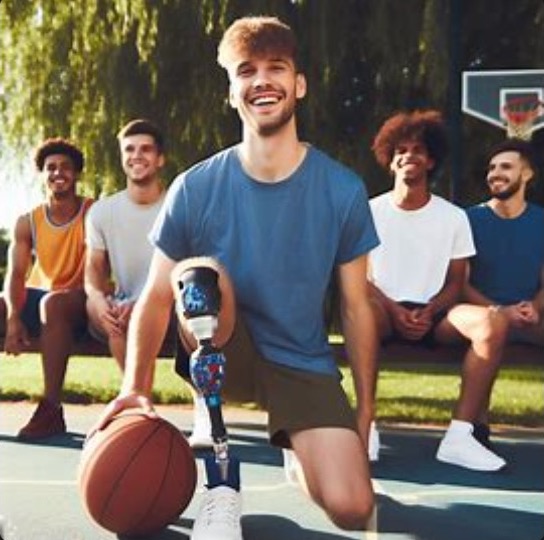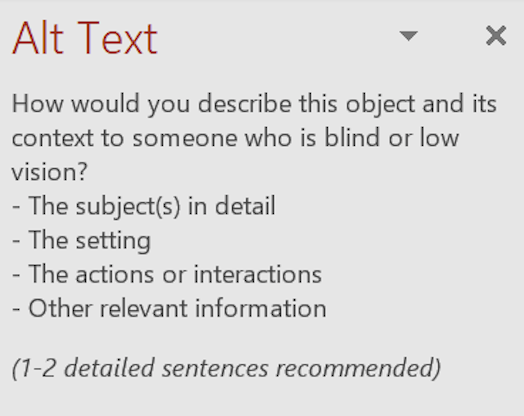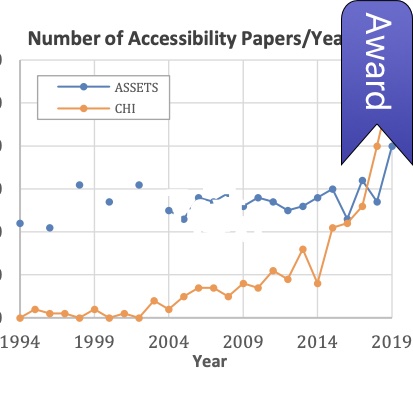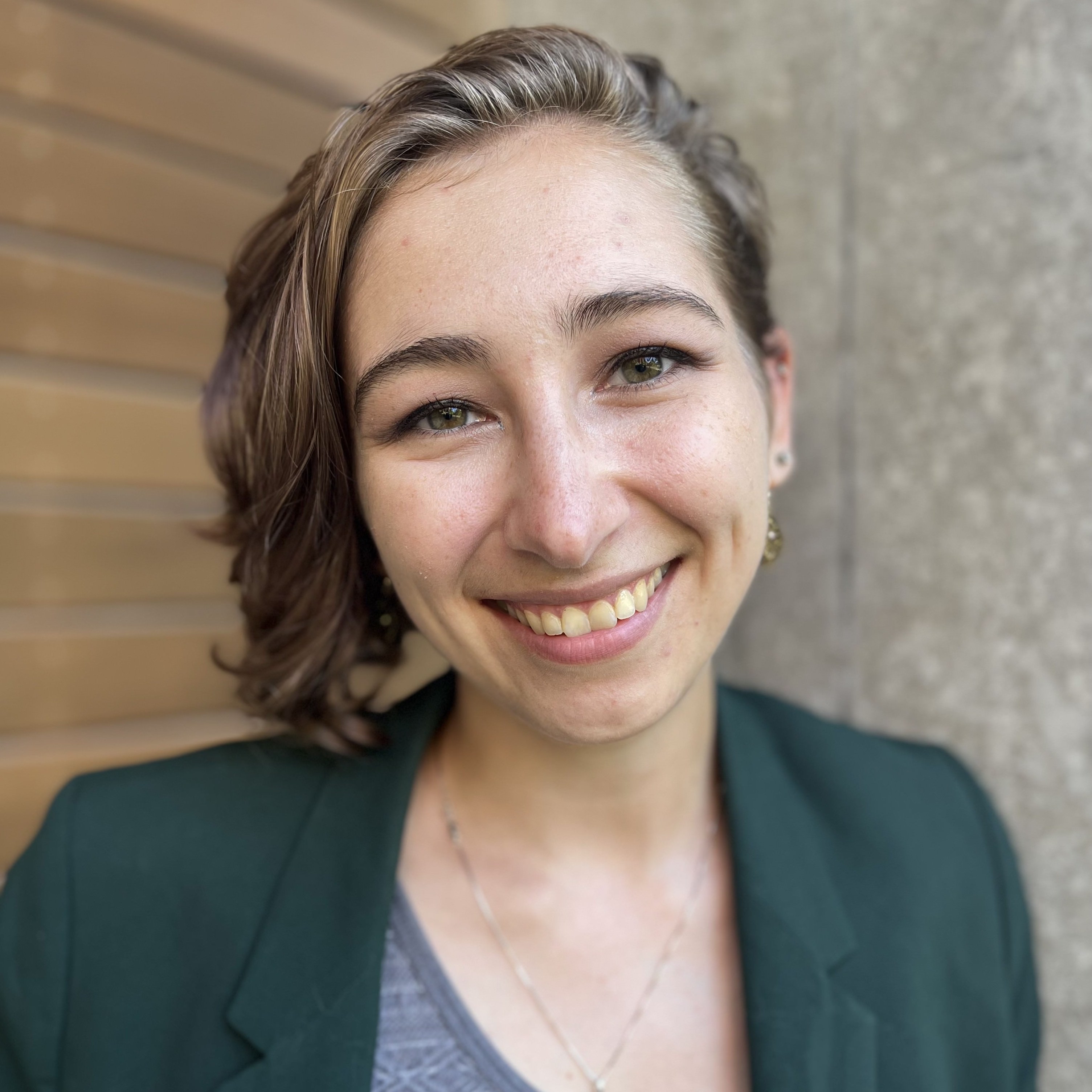About Me
Avery is a postdoctoral researcher at the University of Washington in the department of Human Centered Design and Engineering, working with Dr. Leah Findlater. They earned their PhD in Computer Science from the University of Washington with advisor Jennifer Mankoff, and they earned their Bachelor of Science in Computer Science from the University of Illinois at Urbana-Champaign. Their current work focuses on representation of people with disabilities in digital technologies generative AI tools and digital avatars and AI applications for accessibility while preserving user privacy.
![]() kmack3 [at] uw [dot] edu
kmack3 [at] uw [dot] edu
News
- I'm officially on the job market! I'm looking for industry positions, UX/UXR positions, and other applied research posistions.
Projects
Disability Representation in Text-to-Image AI

In this work, we investigated disability representation in images output from text-to-image (T2I) generative AI systems. Through eight focus groups with 25 people with disabilities, we found that models repeatedly presented reductive archetypes for different disabilities. Often these representations reflected broader societal stereo- types and biases, which our participants were concerned to see reproduced through T2I. Our participants discussed further challenges with using these models including the current reliance on prompt engineering to reach satisfactorily diverse results. Finally, they offered suggestions for how to improve disability representation with solutions like showing multiple, heterogeneous images for a single prompt and including the prompt with images generated. Our discussion reflects on tensions and tradeoffs we found among the diverse perspectives shared to inform future research on representation-oriented generative AI system evaluation metrics and development processes.
Towards Inclusive Avatars: Disability Representation in Avatar Platforms
Digital avatars are an important part of identity representation, but there is little work on understanding how to represent disability. In our study, participants generally preferred to represent their disability identity if the context felt safe and platforms supported their expression, as it was important for feeling authentically represented. They also utilized avatars in strategic ways: as a means to signal and disclose current abilities, access needs, and to raise awareness. Some participants even found avatars to be a more accessible way to communicate than alternatives. We discuss how avatars can support disability identity representation because of their easily customizable format that is not strictly tied to reality. We suggest design recommendations for creating platforms that better support people in representing their disability and other minoritized identities.
Designing Tools for High-Quality Alt Text Authoring

Alternative (alt) text is a description of a digital images so that someone who is blind or low vision or otherwise uses a screen reader to understand image content. Little work examines what it is like to write alt text for an image. We created interface designs to support writing and providing feedback about alt text and tested them with people who write alt text and people who use alt text. Our results suggest that authoring interfaces that support authors in choosing what to include in their descriptions result in higher quality alt text. The feedback interfaces highlighted considerable diferences in the perceptions of authors and SRUs regarding “high-quality” alt text. We discuss the implications of these results on applications that support alt text.
Mixed Abilities and Varied Experiences: a group autoethnography of a virtual summer internship

The COVID-19 pandemic forced many people to convert their daily work lives to a “virtual” format where everyone connected remotely from their home, which affected the accessibility of work environments. We the authors, full time and intern members of an accessibility-focused team at Microsoft Research, reflect on our virtual work experiences as a team consisting of members with a variety of abilities, positions, and seniority during the summer intern season. We reflect on our summer experiences, noting the successful strategies we used to promote access and the areas in which we could have further improved access.
What Do We Mean by "Accessibility Research"?

Accessibility research has grown substantially in the past few decades, yet there has been no literature review of the field. To understand current and historical trends, we created and analyzed a dataset of accessibility papers appearing at CHI and ASSETS since ASSETS’ founding in 1994. Our findings highlight areas that have received disproportionate attention and those that are underserved— for example, over 43% of papers in the past 10 years are on accessibility for blind and low vision people. We also capture common study characteristics, such as the roles of disabled and nondisabled participants as well as sample sizes (e.g., a median of 13 for participant groups with disabilities and older adults). We close by critically reflecting on gaps in the literature and offering guidance for future work in the field.
Select Publications
- K. A. Mack, K. Galzko, J. Islam, M. Hofmann, J. Mankoff. "It's like Goldilocks:" Bespoke Slides for Fluctuating Audience Access Needs. ASSETS ‘24: SIGACCESS Conference on Computers and Accessibility, 2024. Recorded Presentation Video (6 min).
- K. A. Mack, R. Qadri, R. Denton, S. Kane, C. Bennett. "They only care to show us the wheelchair": Disability Representation in Text-to-Image AI Models. CHI ‘24: International Conference on Human Factors in Computing Systems, 2024.
- K. S. Glazko, M. Yamagami, A. Desai, K. A. Mack, V. Potluri, X. Xu, J. Mankoff. An Autoethnographic Case Study of Generative Artificial Intelligence’s Utility for Accessibility. ASSETS ‘23: SIGACCESS Conference on Computers and Accessibility, Experience Report, 2023.
- K. A. Mack, R. C. Hsu, A. Monroy-Hernández, B. Smith, F. Liu. Towards Inclusive Avatars: Disability Representation in Avatar Platforms. CHI ‘23: International Conference on Human Factors in Computing Systems, 2023.
-
 K. A. Mack*, E. McDonnell*, L. Findlater, H. D. Evans. Chronically Under-Addressed: Considerations for HCI Accessibility Practice with Chronically Ill People. ASSETS ‘22: SIGACCESS Conference on Computers and Accessibility, 2022. Recorded Presentation Video (6 min).
K. A. Mack*, E. McDonnell*, L. Findlater, H. D. Evans. Chronically Under-Addressed: Considerations for HCI Accessibility Practice with Chronically Ill People. ASSETS ‘22: SIGACCESS Conference on Computers and Accessibility, 2022. Recorded Presentation Video (6 min). - M. Yamagami, K. A. Mack, J. Mankoff, K. Steele.. I'm Just Overwhelmed'': Investigating Physical Therapy Access and Technology Interventions for People With Disabilities and/or Chronic Conditions . TACCESS ‘22: ACM Transactions on Accessible Computing, 2022.
-
 K. A. Mack, E. McDonnell, V. Potluri, M. Xu, J. Zabala, J. Bigham, J. Mankoff, C. Bennett. Anticipate and Adjust: Cultivating Access in Human-Centered Methods . CHI ‘22: International Conference on Human Factors in Computing Systems, 2022.
K. A. Mack, E. McDonnell, V. Potluri, M. Xu, J. Zabala, J. Bigham, J. Mankoff, C. Bennett. Anticipate and Adjust: Cultivating Access in Human-Centered Methods . CHI ‘22: International Conference on Human Factors in Computing Systems, 2022. -
 K. A. Mack, M. Das, D. Jain, D. Bragg, J. Tang, A. Begel, E. Beneteau, J. Davis, A. Glasser, J. Park, V. Potluri. Mixed Abilities and Varied Experiences: a group autoethnography of a virtual summer internship . ASSETS ‘21: SIGACCESS Conference on Computers and Accessibility, 2021.
K. A. Mack, M. Das, D. Jain, D. Bragg, J. Tang, A. Begel, E. Beneteau, J. Davis, A. Glasser, J. Park, V. Potluri. Mixed Abilities and Varied Experiences: a group autoethnography of a virtual summer internship . ASSETS ‘21: SIGACCESS Conference on Computers and Accessibility, 2021. -
 K. A. Mack, E. Cutrell, B. Lee, M. Morris. Designing Tools for High-Quality Alt Text Authoring . ASSETS ‘21: SIGACCESS Conference on Computers and Accessibility, 2021.
K. A. Mack, E. Cutrell, B. Lee, M. Morris. Designing Tools for High-Quality Alt Text Authoring . ASSETS ‘21: SIGACCESS Conference on Computers and Accessibility, 2021. -
 K. A. Mack, E. McDonnell, D. Jain, L. L. Wang, J. E. Froehlich, L. Findlater. What Do We Mean by "Accessibility Research"? A Literature Survey of Accessibility Papers in CHI and ASSETS from 1994 to 2019. CHI ‘21: International Conference on Human Factors in Computing Systems, 2021. Blog Post. Recorded Presentation (5 min). Honorable mention.
K. A. Mack, E. McDonnell, D. Jain, L. L. Wang, J. E. Froehlich, L. Findlater. What Do We Mean by "Accessibility Research"? A Literature Survey of Accessibility Papers in CHI and ASSETS from 1994 to 2019. CHI ‘21: International Conference on Human Factors in Computing Systems, 2021. Blog Post. Recorded Presentation (5 min). Honorable mention.
- L. L. Wang, K. A. Mack, E. McDonnell, D. Jain, L. Findlater, J. E. Froehlich. A bibliometric analysis of citation diversity in accessibility and HCI research. Late Breaking Wrok, CHI ‘21: International Conference on Human Factors in Computing Systems, 2021.
- T. Gotfrid, K. A. Mack, K. Lum, E. Yang, J. Hodgins, S. Hudson, J. Mankoff. Stitching Together the Experiences of Disabled Knitters. CHI ‘21: International Conference on Human Factors in Computing Systems, 2021.
-
 M. Hofmann, U. Lakshmi, K. A. Mack, R. Arriaga, S. Hudson, J. Mankoff. The Right to Help and the Right Help: Fostering and Regulating CollectiveAction in a Medical Making Reaction to COVID-19. CHI ‘21: International Conference on Human Factors in Computing Systems, 2021. Honorable mention.
M. Hofmann, U. Lakshmi, K. A. Mack, R. Arriaga, S. Hudson, J. Mankoff. The Right to Help and the Right Help: Fostering and Regulating CollectiveAction in a Medical Making Reaction to COVID-19. CHI ‘21: International Conference on Human Factors in Computing Systems, 2021. Honorable mention. -
 U. Lakshmi, M. Hofmann, K. A. Mack, S. Hudson, J. Mankoff, R. Arriaga. Medical Maker Response to COVID-19: Distributed ManufacturingInfrastructure for Stopgap Protective Equipment. CHI ‘21: International Conference on Human Factors in Computing Systems, 2021. Honorable mention.
U. Lakshmi, M. Hofmann, K. A. Mack, S. Hudson, J. Mankoff, R. Arriaga. Medical Maker Response to COVID-19: Distributed ManufacturingInfrastructure for Stopgap Protective Equipment. CHI ‘21: International Conference on Human Factors in Computing Systems, 2021. Honorable mention. - K. A. Mack, D. Bragg, M. Morris, M. Bos, I. Albi, A. Monroy-Hernández. Social App Accessibility for Deaf Signers . CSCW '20: Proceedings of the 2017 ACM Conference on Computer Supported Cooperative Work and Social Computing, Virtual, 2020. Blog Post
- D. Jain, K. A. Mack, A. Amrous, M. Wright, S. Goodman, L. Findlater, J. E. Froehlich. HomeSound: An Iterative Field Deployment of an In-Home Sound Awareness System for Deaf or Hard of Hearing Users . CHI ‘20: International Conference on Human Factors in Computing Systems, Honolulu, United States, 2020.
- K. A. Mack, Sev Huffman. Why Researchers Working with the Deaf Community Should Learn ASL (Workshop Paper). CHI ‘20: International Conference on Human Factors in Computing Systems, Honolulu, United States, 2020.
* Indicates that both authors contributed equally to this work
Industry Internships
- Snap Inc. Research Intern- Summer 2022
- Microsoft Research Intern- Summer 2020
- Microsoft Software Engineering Intern- Summer 2019
- Snap Inc. Research Intern- Fall 2018
- Microsoft Software Engineering Intern- Summer 2018
- Facebook Software Engineering Intern- Summer 2017
- kCura (n.k.a. Relativity) Software Engineering Intern- Summer 2015
Service
- Girls Who Code Facilitator
- Change Makers in Computer Facilitator (teaching minoritized highschoolers about computer science and social justice topics)
- Various departmental service roles (mentoring new students, reviewing applications, organizing events); see CV for more detials
Select Recognitions
- Google Lime Scholar (2020)
- ARCS Foundation Scholar (2019-2021)
- NSF Graduate Research Fellowship Recipient (2019)
- UIUC Bronze Tablet (2019)- top 3% of class
- Boeing Women in Engineering Scholarship (2018)
- NVIDIA John Nickolls Memorial Scholarship (2018)
- Snap Inc. Research Scholar (2018)
- CRA Outstanding Undergraduate Researcher Award Honorable Mention (2018)

